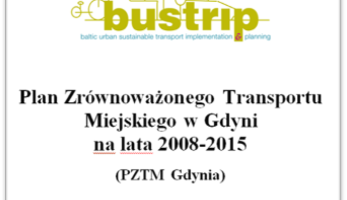Advancing towards a dynamic SUMP
Summary
Gdynia ventured into sustainable urban mobility planning many years ago. This measure was supposed to consolidate existing urban and transport planning frameworks and use modelling and information technologies to develop a new Sustainable Urban Mobility Plan (SUMP). Web 2.0 applications has facilitated active participation of citizens and enhance the involvement of relevant stakeholders in the planning process. The result was a legalised comprehensive SUMP which serves as a model for cities in Poland and the Baltic region.
Implementing sustainable mobility
Although Poland has a well-established planning culture and espouses cross-sectoral approaches, active involvement of citizens and stakeholders is a novelty in Polish cities. Updating and further developing the existing planning documents towards a true SUMP for Gdynia served as an example for other cities in the country. It helps to define the requirements and conditions for the introduced compulsory sustainable urban mobility plans in these cities. The use of ICT based tools for data collection, modelling and public sharing of information is an innovative aspect in the measure. This was mainly done through measures G1.2 Community projects from SUMP, G3.1 Traffic model development to expand Gdynia's SUMP and G3.4 Mobility 2.0 communication.
The main objectives of this measure were:
- Consolidation of existing urban and transport planning frameworks
- Discussion and development of a new generation SUMP involving actively all stakeholders
- Acceptance of the SUMP by all stakeholders (>50% public support) and approval by the City Council
- Promotion of the SUMP process as a best practice case (model of transferability) for other cities in Poland
Progress
Gdynia has three legal documents which relate to transport planning. Its Strategy of Development is the most important legal document since 1998. As a working document, it is updated every five years. The city’s Transport Policy is also a legal document that has been available since 1998, complementing the goals of Gdynia's Strategy of Development. Both these documents set goals but lack details on how to achieve them.
Thirdly, Gdynia has a Plan of Sustainable Public Transport Development for 2014-2025 which sets goals for the development of high-quality services and efficient operation of public transport in Gdynia. However, this plan focuses on public transport and lacks information for other modes of transport and mobility.
In 2007, as a result of the European project BUSTRIP, Gdynia developed a Sustainable Urban Transport Plan (SUTP) for 2008-2015. Although the plan was not finished and formally adopted by the City Council, it serves as an important working document. It addresses the actions, activities and measures which are necessary to establish a sustainable urban transport system in Gdynia as part of the Tri-City. This SUTPneeded to be updated, extended and approved by City Council as an official SUMP for Gdynia.
The following tasks supported the work on the SUMP:
- The SUTP was verified with key transport documents that are effective in Gdynia
- Baseline scenario of the transport system was assessed
- Targets were checked for their attainability and verifiability
- Barriers were identified (i.e. lack of cooperation with stakeholders, lack of resources to carry out the task to a high standard)
- A working group was established
Due to the necessity to elaborate and ratify the SUMP, the activities and their timeframe within the plan, estimation of costs and the way of financing was discussed. Consultations with stakeholders and the local community took place. Community consultations were held within the framework of measure G3.4 Mobility 2.0 communication (on the basis of such tools
as internet platform, internet for social communities and online surveys with the local community) which has significantly contribute to the SUMP elaboration.
For the purposes of setting the objectives, a self-assessment was conducted. Based on its results and on consultations with stakeholders, the priorities were established for Gdynia’s mobility strategy. Gdynia has prepared a long-term strategy and short-term action plan which will be monitored and updated every 2-3 years.
At the end, the acceptance and approval of the SUMP on the local level took place so that it becomes a legal document approved by the City Council. As a result, the legal document – SUMP for Gdynia including an action plan with timetable for tasks – the allocation of financial means and the responsible bodies were elaborated to enable full implementation of the SUMP.
The implementation phase involved the following:
- Organisation of consultations on the existing SUMP
- Updating the existing SUTP
- Approval of the new SUMP
- As a pilot action within the SUMP process, the City of Gdynia has tested a mobility plan for a city institution. The plan was elaborated on the basis of detailed analysis of home-to-work trips of employees and was conducted with the help of a dedicated application. With the pilot, the City of Gdynia can test mobility planning at institution level. Piloting has created a basis for replication on a wider scale in the following years.
- Gdynia was a living laboratory for the SUMP process in Baltic Sea Region. The process and its results are presented via BSR Competence Centre on SUMP platforms at www.bsr-sump.eu / http://polska.bsr-sump.eu/.
Outcomes
Tangible outputs:
- Draft SUMP submitted to the City Council
- First dynamic SUMP for the city implemented
Expected outcomes in the short- to medium-term:
- Public debate on sustainable urban transport
- Introduction of innovative practices regarding the legal documents elaborated in the city’s planning department
- Consolidation of urban and transport planning frameworks
Expected outcomes in the mid- to long-term:
- Increased awareness of the local community and stakeholders on sustainable urban transport issues
- Gdynia as a model for sustainable transport planning in Poland







